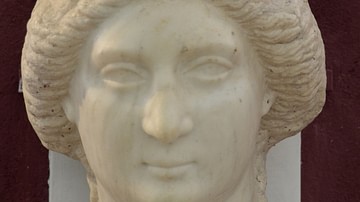Search
Did you mean: Darius I?
Search Results

Definition
Leo III
Leo III was emperor of the Byzantine Empire from 717 to 741 CE. He founded the Isaurian dynasty which ruled until 802 CE. The emperor was a talented administrator, and he revamped the empire's political apparatus and legal code. Leo's reign...

Definition
Xerxes I
Xerxes I (l. 519-465, r. 486-465 BCE), also known as Xerxes the Great, was the king of the Persian Achaemenid Empire. His official title was Shahanshah which, though usually translated as `emperor', actually means `king of kings'. He is identified...

Definition
William III of England
William III of England (also William II of Scotland, r. 1689-1702) became king of England, Scotland, and Ireland after the Glorious Revolution of 1688. Protestant William, Prince of Orange, was invited to rule jointly with his wife Mary II...

Definition
Henry III of England
Henry III of England ruled from 1216 to 1272 CE. The son of the unpopular King John of England (r. 1199-1216 CE), Henry was immediately faced with the ongoing Barons' War which had been fuelled by discontent over John's rule and his failure...

Definition
Abd al-Rahman III
Abd al-Rahman III was an Umayyad prince who reigned as Emir of Cordoba, and later Caliph of Cordoba, from 912 to 961 CE. His reign is remembered as a golden age of Muslim Spain and Umayyad rule, epitomized by his declaration of the second...

Definition
Persian Literature
Persian literature differs from the common definition of “literature” in that it is not confined to lyrical compositions, to poetry or imaginative prose, because the central elements of these appear, to greater or lesser degrees, in all the...

Definition
Hephaestion
Hephaestion was a member of Alexander the Great's personal bodyguard and the Macedonian king's closest and lifelong friend and advisor. So much so, Hephaestion's death would bring the young king to tears. From 334 to 323 BCE Alexander the...

Definition
Egyptian Empire
The Egyptian Empire rose during the period of the New Kingdom (c. 1570- c. 1069 BCE), when the country reached its height of wealth, international prestige, and military might. The empire stretched from modern-day Syria in the north to modern-day...

Definition
Alexander the Great
Alexander III of Macedon, better known as Alexander the Great (l. 21 July 356 BCE – 10 or 11 June 323 BCE, r. 336-323 BCE), was the son of King Philip II of Macedon (r. 359-336 BCE) who became king upon his father's death in 336 BCE and then...

Article
Twelve Great Women of Ancient Persia
Women in ancient Persia had more rights and greater freedom than any other ancient civilization including, according to some scholars, even ancient Egypt which is famous for its respect for the feminine principle in religion as well as daily...